Using Sitefinity’s SEO Capabilities: A Simple Sitefinity SEO Guide To Increase Your Website’s Traffic & Drive Sales
Estimated Reading Time: 14 MinutesThis is a straight-forward article meant to give you the tools you need to help ensure that your Sitefinity website performs as well as possible in search results.
What Is SEO?
SEO is the practice of increasing your website’s visibility in search results. The goal of SEO is to increase the amount of qualified traffic coming to your website. SEO is often done through a process of keyword research, creating content for your Sitefinity website, internal linking, and with a Sitefinity developer, improving your website’s underlying technical SEO requirements so that it loads faster and provides a superior user-experience for your customers.
This may also involve moving your website to a hosting platform that is purpose built for Sitefinity websites as generic hosting platforms can impair Sitefinity CMS’s performance.
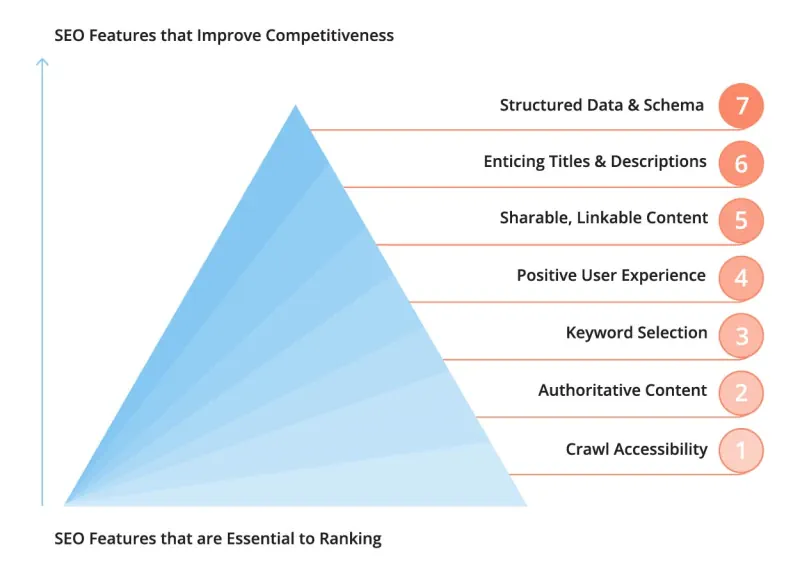
Why Is SEO Important For Your Sitefinity Website?
When your customers are searching for the products and services that your company provides, you want your website to appear as close to the top of search results for those keywords as possible.
That’s because over 25% of people click on the first Google search result when searching.
While you want to be in the top 3 results if possible, every position you move up from 4-8 should increase your webpage’s traffic by roughly 2.8%.
Therefore, to get more customers coming to your Sitefinity website, and producing more sales and leads for your business, you will want to use SEO to move your website up toward the top of search results.
How Does SEO Work For Sitefinity Websites?
There are over 200 ranking signals Google uses when determining where to display your website in their search results.
Because of the number of ranking factors that Google may use to evaluate your website’s SEO, there’s no one simple way to explain how to best optimize your website for search engines. It is a cumulative process of making sure you run through a SEO checklist before publishing a new website, auditing websites that currently exist, and finally developing a solid SEO strategy to help ensure your Sitefinity website SEO is consistent across the entire site.
The Three Parts Of SEO
When evaluating your Sitefinity website’s SEO, there are three main branches you have to consider. They are:
- Technical SEO
- On-page SEO
- Off-page SEO
What Is Technical SEO?
Technical SEO focuses on the underlying infrastructure of your website. This portion of SEO will often require you working with your Sitefinity developer to improve mobile-friendliness, page loading speeds, and metadata implementation.
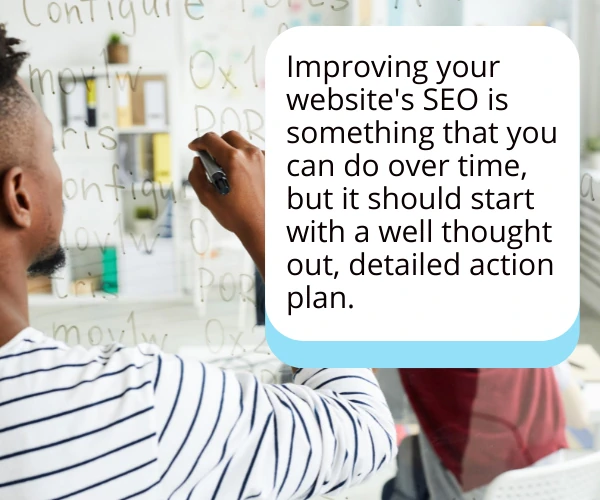
Why Is Technical SEO Important For Your Sitefinity Website?
Technical SEO helps ensure that search engines are able to properly crawl and index your Sitefinity website.
Technical SEO is normally easier to improve with smaller websites. Larger websites tend to have more complex technical SEO issues that will take more time to work through and correct.
If you work on your Siteinfity websites technical SEO, it will help search engines understand what your website is about, and it’s relevance to various search keywords your customers may be using when searching for the products or services you offer.
Improving Your Sitefinity Website’s Technical SEO
Technical SEO is the foundation on which your Sitefinity CMS website’s SEO is built. Working on some parts of your website’s technical SEO will require having a good partnership with your Sitefinity developer.
Index Management
The first thing you will want to do is be sure that your important pages do not have the “noindex” tag on them.
A no index tag will prevent search engines from indexing your webpage, meaning that they can’t possibly show it to your customers when they are searching for the types of services your company provides.
Setting Up A Sitemap Using Sitefinty’s Sitemap Tool
A sitemap helps search engines know what pages are on your website.
Fortunately, Sitefinity has a great tool that will help you automatically create a sitemap for search engines to use when crawling your website and discovering new content.
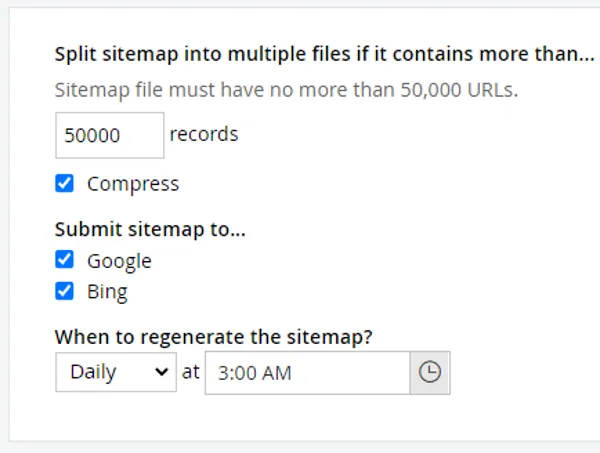
Improving Page Speed
You can test your website’s page speed using Google Page Speed Insights tool.
Page speed can be defined as the amount of time it takes your webpage to load for a user when they come to your website. When a webpage takes a long time to load, it can frustrate your potential customers causing them to give up and go to a competitors website to solve their problem and get what they need.
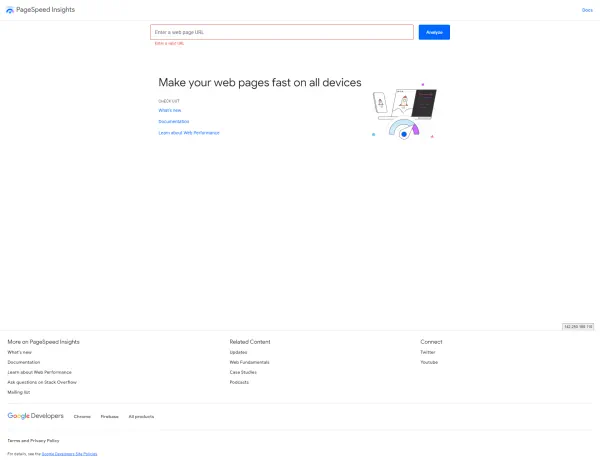
Sitefinity’s Built In Page Speed Tools
Fortunately, Sitefinity has a variety of tools built into the CMS that can help you dramatically improve your website’s page speed scores.
Code Compression – This tool allows you to minify and compress the code of your web pages so that users can access them more quickly.
Combining Requests – This tool helps reduce render blocking JavaScript which will also help your web pages load more quickly for your potential customers when they visit your website.
Browser Caching – Sitefinity has an advanced caching system that will help speed up the performance of your Sitefinity CMS website. One of the caching tools built into Sitefinity is meant to leverage browser caching, which is particularly useful as your customers move page-to-page in your website.
Mobile-friendliness
If your website doesn’t work well on cell phones or users need to pinch and zoom to read your website’s content, then you will want to leverage your Sitefinity developer’s front-end skill sets to either create a new resource package that has responsiveness in mind, or improve your existing resource package if possible.
Mobile-friendliness has been on Google’s mind since 2015, and it will always be an important SEO ranking signal.
While most newer websites are built to be responsive, if you have an older Sitefinity website, you will want to get it upgraded so that your business has a better chance of being featured more prominently in search results.

301 Redirects
The last technical SEO tool that you will want to use is for creating 301 redirects from pages that no longer exist to pages of your Sitefinity website that may serve a similar, or better purpose.
Sitefinity has a short tutorial on how to create redirects from right within your Sitefinity CMS dashboard.
What Is On-page SEO?
On-page SEO focuses on the HTML code of your Sitefinity resource package, and the content on each of your website’s pages.
On-page SEO is something that you may need help from your Sitefinity partner to implement and correct so that your website performs as well as it should in search engines.
We Are Here For You
Do you know that you need SEO for your website, but it seems like a little too much to take on right now? No problem, we are always here to help. Just reach out to us below.
Why is On-page SEO Important For Your Sitefinity Website?
Improving your Sitefinity website’s on-page SEO helps search engines understand the content of your website. It’s important that search engines be able to easily understand the content of your website so that they can determine its relevance to search queries.
Improving the HTML of your website can help make it faster, and more clearly describe the content of each page for search engines to understand.
Improving the structure, depth, and helpfulness of your content in such a way that improves your website’s user experience will help establish your company of an influential voice in your business vertical online.
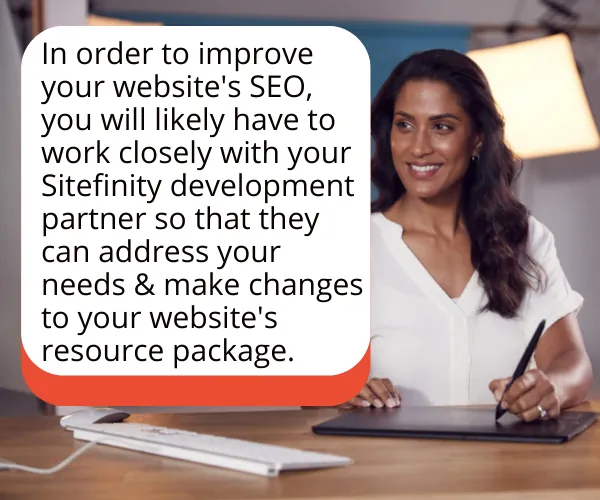
Improving Your Sitefinity Website’s Resource Package For Better On-page SEO
The resource package of your Sitefinity website controls everything from how your website appears and is styled for users, to how content is made available to search engines so they understand what your business is about.
When it comes to your website’s HTML output, the resource package controls the availability of important on-page SEO elements such as the title tag, meta description, any tags, content categorization, and the overall crawlability of your website.
By ensure that the important tags (title, h1, etc.) are on every page and reducing any HTML bloat that is in your current resource package, you will reduce the length of time it takes your website to load, and present your content to Google and other search engines in a more clean and clear manner so that they can feature it in search results more easily.
Title Tags
your title tags tell users and search engines what a specific page on your Sitefinity website is about. There are some easy to follow rules for writing great title tags.
- Keep them to 50-60 words in length.
- Put the most important keywords for your web page near the beginning of the title tag.
- Be descriptive and enticing so that users will want to click on your title to learn more.

Creating Great Content For Your Sitefinity Website
Content comes in all shapes and sizes, but the rule of thumb is that you don’t want to publish anything on your website that won’t be valuable or helpful to your potential customers.
Being helpful is a big focus in 2023 and beyond as Google has begun to release core ranking updates that revolve around judging if your website’s content is actually useful or just taking up space in search results.
All of your website’s content should be “People-first.”
What Is People First Content?
When creating content to improve your Sitefinty website’s presence in search results, it is not uncommon for writers to stuff keywords into the content, or create content meant just to rank for a keyword without considering if it would be valuable for people to consume.
Here’s a few questions Google has suggested you ask yourself when creating people-first content.
- Do you have an existing or intended audience for your business or site that would find the content useful if they came directly to you?
- Does your content clearly demonstrate first-hand expertise and a depth of knowledge (for example, expertise that comes from having actually used a product or service, or visiting a place)?
- Does your site have a primary purpose or focus?
- After reading your content, will someone leave feeling they’ve learned enough about a topic to help achieve their goal?
- Will someone reading your content leave feeling like they’ve had a satisfying experience?
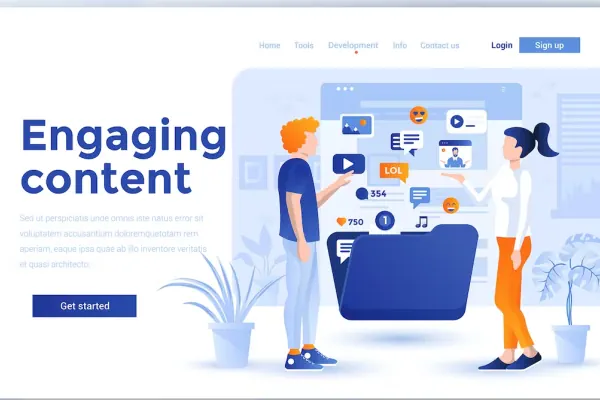
Leveraging Sitefinity’s Blog Functionality For On-page SEO
While creating your people-first content, you can leverage Sitefinity’s blog functionality that will give you a powerful and easy way to manage the content you make available to your customers.
Sitefinity has excellent documentation for setting up a blog on your website.
Just be sure to keep your content helpful, informative, and valuable to your customers and don’t get tempted to just begin producing blog posts to soak up search engine traffic.
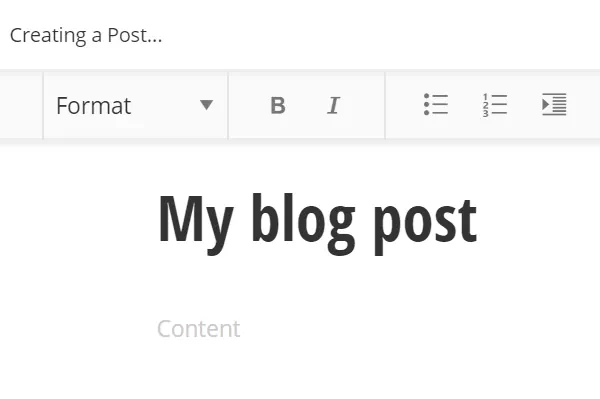
Images – Size, Type, and Alt Text
Optimizing your Sitefinity website’s images can be part of technical SEO and part of on-page SEO. The goal is to make your images a small as possible so that they download to a user’s device quickly without harming page speed scores, while also containing descriptive ALT text that’s helps to users with disabilities.
Image Size
You will want to be sure that all of your website’s images are saved in the modern .webp format. .Webp is an image container that was developed by Google to help improve user-experience and promote faster loading websites.
If you are using a windows machine, paint.net is an excellent and easy to use program that will let you save your images in the .webp format.
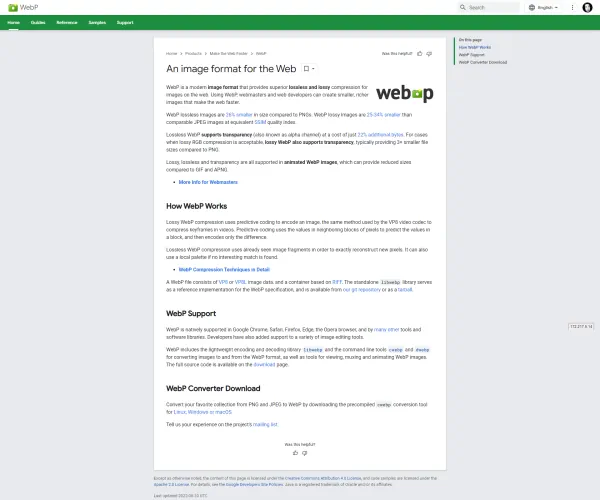
Image ALT text
The ALT text used for images it primarily meant to help your website visitors who may have disabilities that prevent them from using your website like others would.
in addition to that, search engines may use ALT text to better understand the content of images in your content, and use it as a ranking signal.
Here’s an excellent explanation of how to use ALT text to improve your website’s on-page SEO and to be useful for users with disabilities.
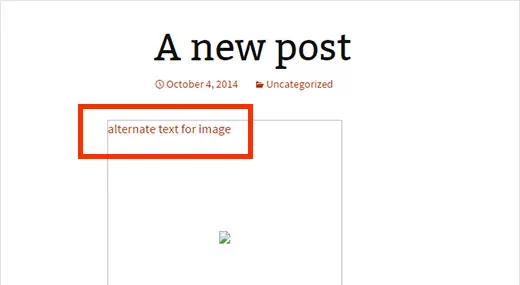
Internal Link Building
In the world of SEO, there are two types of links. External links, which are links from other domains, and sometimes called “Backlinks.” Then there are internal links, or links within your Sitefinity website in-between related pages.
Google’s own John Mueller has went on record to express the importance of internal linking for your overall SEO efforts when asked.
When asked if internal linking was still important even if your website used breadcrumbs, his exact statement was:
“Yes, absolutely.
It’s something where internal linking is super critical for SEO.
I think it’s one of the biggest things that you can do on a website to kind of guide Google and guide visitors to the pages that you think are important.”
John Mueller, English Google SEO office-hours from March 4, 2022
Fortunately, Sitefinity makes creating internal links between your related pages easy, directly from the built in content editor.
What Is Off-page SEO
Off-page SEO are any SEO efforts you take on that are outside of your website. For instance, any type of promotion or marketing that you do which creates a permanent backlink to your website will help increase your website’s authority and prominence in search results.
In some circles, this can be referred to as link building, but we don’t like to think of off-page SEO as strictly link building.
Your goal should be to promote your business on other websites, by sharing original research, or unique points of view that help establish or expertise and authority online. If you focus purely on creating backlinks, it becomes a slippery slope that can lead to the creation of spammy backlinks that may cause your website ill effect over time.
Why Is Off-page SEO Important For Your Sitefinity Website?
Much like producing high-value content on your website is important to help you establish your presence and authority online, off-page SEO also helps you establish your company’s presence online.
Off-page SEO has often been compared to a voting system, where each backlink is an additional vote for your website’s credibility and worthiness to rank highly in search results.
How Does Off-page SEO Work?
There are a variety of ways to tackle the challenge of off-page SEO, but it is normally best done by a professional SEO with a proven track record of white hat (ethical) SEO success.
If you want to take on the challenge yourself but aren’t sure where to begin, you can start with platforms such as qwoted to help put you in touch with journalists looking for help with their stories.
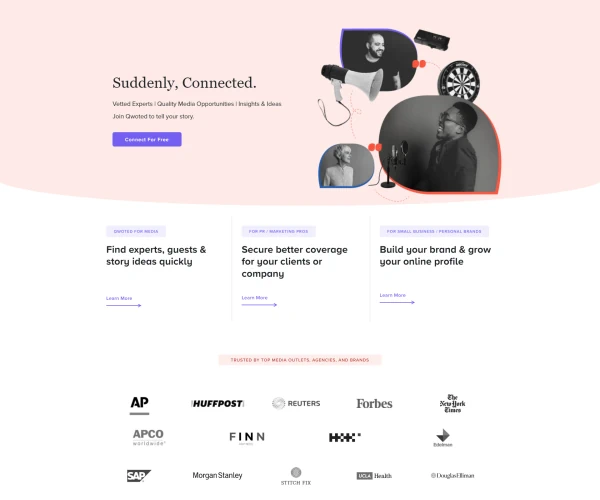
How Does Sitefinity Help With Off-page SEO?
Sitefinity CMS will allow you to create a professional, informative, authoritative website for your business that journalists and other people in your industry will feel comfortable linking to.
Sitefinity isn’t capable of reaching out to bloggers and the like to ask for interviews, but it will certainly help you present yourself and your business in a manner that encourages backlinks and other off-page SEO efforts.
You’re In Good Hands
We know this article may have been a lot to take on all at once. If you need some help or advice on how to get started, send us a message. We’re always happy to help.
Revisit A Section
- What Is SEO?
- Why Is SEO Important For Your Sitefinity Website?
- How Does SEO Work For Sitefinity Websites?
- The Three Parts Of SEO
- What Is Technical SEO?
- Why Is Technical SEO Important For Your Sitefinity Website?
- Improving Your Sitefinity Website’s Technical SEO
- Index Management
- Setting Up A Sitemap Using Sitefinty’s Sitemap Tool
- Improving Page Speed
- Sitefinity’s Built In Page Speed Tools
- Mobile-friendliness
- 301 Redirects
- What Is On-page SEO?
- Why is On-page SEO Important For Your Sitefinity Website?
- Improving Your Sitefinity Website’s Resource Package For Better On-page SEO
- Title Tags
- Creating Great Content For Your Sitefinity Website
- What Is People First Content?
- Leveraging Sitefinity’s Blog Functionality For On-page SEO
- Images – Size, Type, and Alt Text
- Image Size
- Image ALT text
- Internal Link Building
- What Is Off-page SEO
- Why Is Off-page SEO Important For Your Sitefinity Website?
- How Does Off-page SEO Work?
- How Does Sitefinity Help With Off-page SEO?





